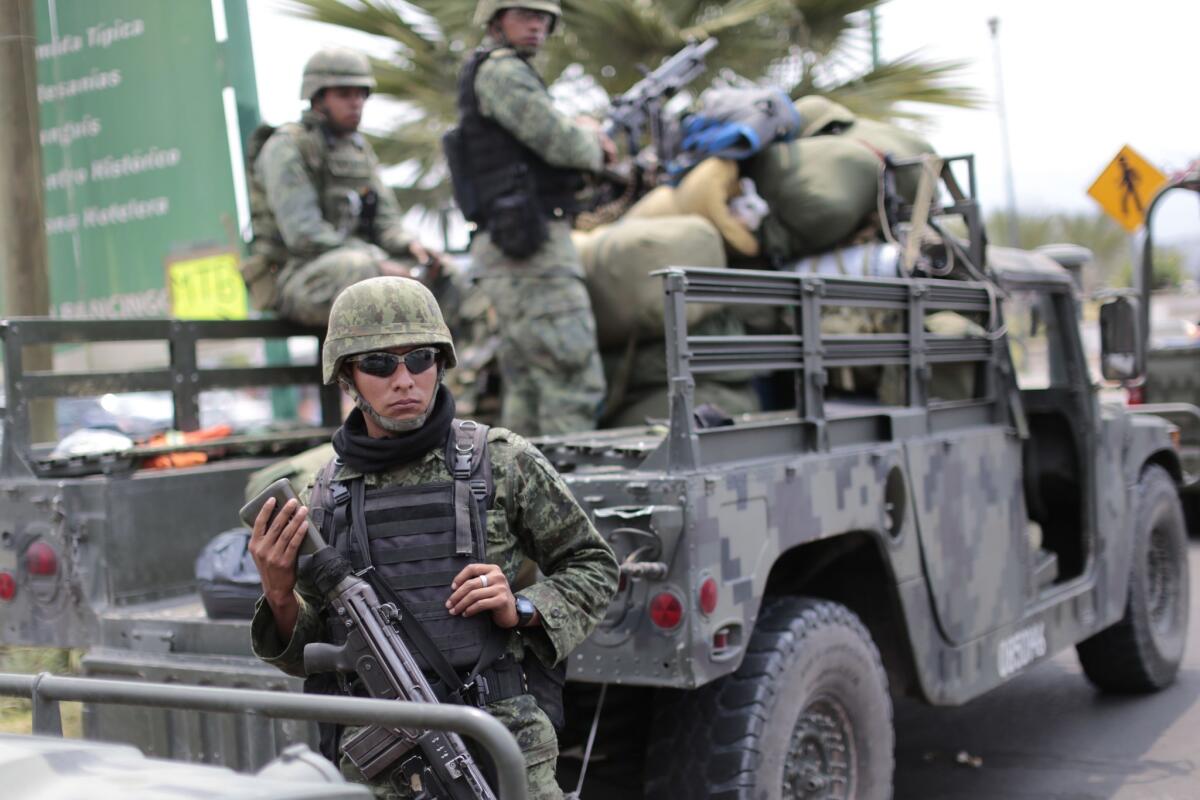Op-Ed: Three leaders from Latin America call for decriminalizing drug use

Mexican soldiers stand guard outside Chilapa in the state of Guerrero, a combat zone for drug gangs, in May 2015.
- Share via
Outdated drug policies around the world have resulted in soaring drug-related violence, overstretched criminal justice systems, runaway corruption and mangled democratic institutions. After reviewing the evidence, consulting drug policy experts and examining our own failures on this front while in office, we came to an unavoidable conclusion: The “war on drugs” is an unmitigated disaster.
For nearly a decade, we have urged governments and international bodies to promote a more humane, informed and effective approach to dealing with “illegal” drugs. We saw a major breakthrough a few years ago, when the United Nations agreed to convene a special session of the General Assembly to review global drug policy. It is scheduled to begin April 19.
Unfortunately, this historic event — the first of its kind in 18 years — appears to be foundering even before it gets off the ground. What was supposed to be an open, honest and data-driven debate about drug policies has turned into a narrowly conceived closed-door affair.
In the lead-up to next month’s session, the U.N. Commission on Narcotic Drugs in Vienna held a series of preparatory meetings with its 53 member countries. The commission took responsibility for crafting a declaration to be adopted by all 193 U.N. members of the General Assembly, and should finish next week.
Is this one way to fight the drug problem? Weigh in on our Facebook page >>
But most of these commission-led negotiations have been neither transparent nor inclusive. Input from key U.N. agencies working on health, gender, human rights and development — and the majority of U.N. member states — was excluded. Likewise, dozens of civil society groups from around the world were shut out of the meetings.
Further, the draft declaration represents a setback rather than a step forward. It does not acknowledge the comprehensive failure of the current drug control system to reduce supply or demand. Instead, it perpetuates the criminalization of producers and consumers. The declaration proposes few practical solutions to improve human rights or public health. In short, it offers little hope of progress to the hundreds of millions of people suffering under our failed global drug control regime.
Diplomats attending the UN special session on drugs next month must confront the obvious failure of most existing drug laws.
If the U.N. wants to seriously confront the drug problem in a way that actually promotes the health and welfare of humanity, here are the proposals the General Assembly should adopt.
First, all U.N. member states should end the criminalization and incarceration of drug users — an essential step toward strengthening public health, upholding human rights and ensuring fundamental freedoms. Second, all governments should immediately abolish capital punishment for drug-related offenses. It is a medieval practice that should be stamped out once and for all. Third, U.N. member states must empower the World Health Organization to review the scheduling system of drugs on the basis of science, not ideology.
Most important, diplomats attending the special session on drugs next month must confront the obvious failure of most existing drug laws. The only way to wrest control of the drug trade from organized crime, reduce violence and curb corruption is for governments to control and regulate drugs.
This is not as radical as it sounds. Innovative experiments in drug regulation are underway around the world, and they offer important lessons to those who are prepared to listen.
Switzerland’s national health plan, for example, now supports heroin-assisted treatment and maintenance doses for addicts in order to reduce harm to users. Portugal decriminalized the use of all drugs in 2001, with significant crime reduction and public health benefits, including decreasing rates of HIV transmission.
Dramatic changes in drug policy are also taking place across the Americas. In the U.S., 23 states have legalized marijuana for medicinal purposes and four for recreational use. Most Latin American governments are taking steps, albeit timid ones, to decriminalize the consumption of some drugs. Uruguay has gone the furthest: it regulated its cannabis market from production to distribution to sale, with human rights at the center of the country´s strategy.
There is still time to get the U.N. special session back on track, and we hope that will happen. But even if the gathering does not live up to its full potential, we encourage heads of state and governments to test approaches to drugs that are based in scientific evidence and local realities. That’s the only way to arrive at an effective global drug control system that puts people’s lives, safety and dignity first.
Fernando Henrique Cardoso is the former president of Brazil and chair of the Global Commission on Drug Policy. Cesar Gaviria is the former president of Colombia. Ernesto Zedillo is the former president of Mexico.
Follow the Opinion section on Twitter @latimesopinion and Facebook
ALSO
Who’s to blame for Donald Trump?
60 years later, the Southern Manifesto is as alive as ever
This 11-year-old wants L.A.’s streets to be safe for everyone — not just cars
More to Read
A cure for the common opinion
Get thought-provoking perspectives with our weekly newsletter.
You may occasionally receive promotional content from the Los Angeles Times.






